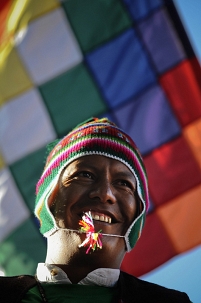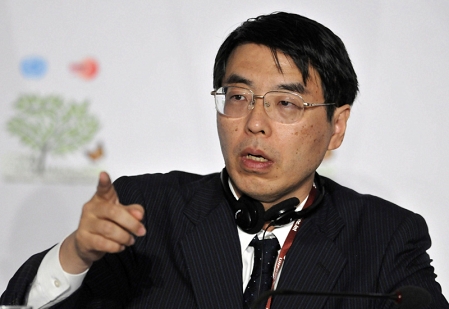Erstellt am: 10. 12. 2010 - 13:02 Uhr
This is Compensation Not Charity
A year ago at the last climate summit, the $30 billion of fast-tracked money for climate adaptation was the carrot used to tempt reluctant developing nations like the Maldives and Ethiopia to sign up to the Copenhagen Accord, a climate deal that was widely seen as suiting the rich, polluting countries rather than the poor, vulnerable ones.
Yet much of the money promised by the rich nations – which the text stipulated should be “new and additional” money - has failed to materialize. And critics say the money that has been made available largely consists of pledges that already existed before Copenhagen and which have simply been relabeled or diverted from existing aid budgets.

EFE Roberto Escobar
Rich nations talk about the money being in the infamous “pipeline” but such miserliness has undermined hopes that the Cancun summit would be able to tackle the mistrust between the developed and developing world that so shackled Copenhagen.
As Fm4’s correspondent in Cancun Nadja Hahn points out Austria is one of the countries being criticized for not taking the term “new and additional” seriously enough. Austria has paid the 40 million Euros into the fund that it had promised. Yet NGOs say this money had been set aside before Copenhagen. So, says Hahn, “Austria has basically taken the money away from a different project and repackaged.”
Dieses Element ist nicht mehr verfügbar
Nadia Hahn on Austria's contributions to the climate fund
Meanwhile the USA has hinted it might block any agreement on climate financing for poor countries as well as progress on fighting deforestation unless it is satisfied with progress on its key issues such as the monitoring of developing nations' carbon cuts.
A debt has been accrued
But why are industrialized nations giving climate aid for adaptation in the first place?
It is because the 200 years of carbon-rich development on which they built the foundations of their powerful and dominant economies came at a hidden cost to the environment. And the poor countries, which are already suffering the effects of climate change, are picking up the bill for that cost. NGOs want us to be very clear about this: the adaptation fund was conceived as compensation. They say it is arrogant and disingenuous to treat it as a charity into which they can pay when they feel in a more bountiful mood.
In the West we would like the poor countries - those that are least responsible for creating the problem of climate change - to take a clean, low-carbon path towards development. But that makes development much more expensive since the technology is less established and less readily available. These poor countries need to invest very heavily and very quickly in reducing the vulnerability of their populations to climate shocks and, without immediate financial help they don’t have to money to do that.
A Daily Reality
For poor countries, climate change isn’t a future threat. It is a daily reality – and that comes at a mitigation cost that needs paying now. I spoke to the Guardian’s environment editor John Vidal at the end of his epic journey across Latin America to witness how climate change is already affecting communities. His trip took him from the airy heights of the Mount Cayambe glacier, which is dripping away 5,000 metres above the sea level, to the thick jungle atmosphere of the oil wells deep in the Amazon rainforest.
Fm4 reports from the16th UN convention in Cancun. What does REDD really mean for climate change and for indigeneous people?
On his “climate change tour" he spoke to many people on the way about how climate change was affecting their lives: “Everyone had a story to tell, whether it was of rivers and streams drying up or glaciers melting or the snows not coming. In so many cases, climate change had visibly changed the landscape they remembered from their youth.”
Vidal found “water wars” breaking out in areas where water was short. In one province of Peru, the regional government officials told him that they were aware of at least 1,000 separate conflicts over water. 50 of these were serious conflicts. The day after he left a local town there were protests against the taps being turned off for most of the day. The demonstration turned violent and one of the protesters was killed.
Right across Latin America, the host region of this year’s climate summit, people have been suffering from extreme weather. There has been the worst rainfall in Colombia in 50 years, for example, and the worst cold snaps on Peruvian records. “Every single country“, says Vidal, “is witnessing definite extremes which they believe are linked to climate change.”

EFE ALEJANDRO BOLIVAR
But their concerns won’t be properly addressed at the Cancun summit. With just hours to go, the USA and China, who between them account for 43% of global emissions, are stubbornly playing a game of ‘you first’ and officials have long been talking about achieving “incremental progress” rather than any binding deal. Japan has already said it won’t sign up to a successor to Kyoto, thereby dealing a massive blow to the concept of a binding deal on carbon cuts even at future summits.

EFE Roberto Escobar
Instead UN officials have been hoping to find global consensus on side issues like finding a market to give countries an incentive to deforestation.
Protesters have likened this to organizing blood transfusion for a patient while a lion is still gnawing at his leg. Evo Morales, the President of Bolivia, has complained that rich countries are pushing schemes like REDD, that would create a market price for preserving forests, because they are more interested in reviving capitalism than they are in saving the environment. “We are not here to convert nature into a commodity,” he said.


